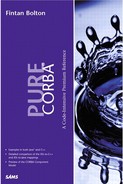0%
169Chapters
0-1Hours read
0kTotal Words
Book Description
PURE CORBA 3 is a premium, code-intensive reference for professional developers. It focuses on the core specification for CORBA 3 and contains:
conceptual overview of CORBA 3.
CORBA techniques programming reference that contains thousands of lines of commercial-quality code examples in both C++ and Java (the two most popular languages among CORBA developers).
concise reference to the most important parts of the specification,
Table of Contents
- Copyright
- About the Author
- About the Contributing Authors
- Acknowledgments
- Tell Us What You Think!
- Introduction
- Conceptual Reference
- CORBA Architecture
- Programming with CORBA
- A Basic Client-Server Application—Example 1
- Basic IDL Mapping (Example 1)
- Initializing a CORBA Application
- Adding an IDL Interface for Searching—Example 2
- IDL Mapping for Some Complex Types (Example 2)
- Returning Parameters
- Adding Exception Handling—Example 3
- IDL Mapping (3)
- Adding a Multiply-Inheriting IDL Interface—Example 4
- Multiple Inheritance and the Delegation (Tie) Approach (Example 4)
- Adding CORBA Naming Service Support—Example 5
- More IDL Syntax and Rules for Mapping Identifiers
- More About Servers
- Summary
- Techniques
- A Sample CORBA System
- Memory Management
- Object References
- Interoperable Naming Service
- The Portable Object Adapter
- The any Type
- Callbacks
- Interceptors
- Objects by Value
- Events Service
- CORBA Components
- Basic Architecture
- Defining IDL for Components
- Generating Component Skeletons
- Implementing Components
- Implementing Component Homes
- Implementing Clients
- Container Programming Environment
- Extended Components
- Development and Deployment Roles
- Component Assembly and Deployment
- Summary
- Components IDL Module
- The Internet Inter-ORB Protocol
- Syntax Reference
- Index
